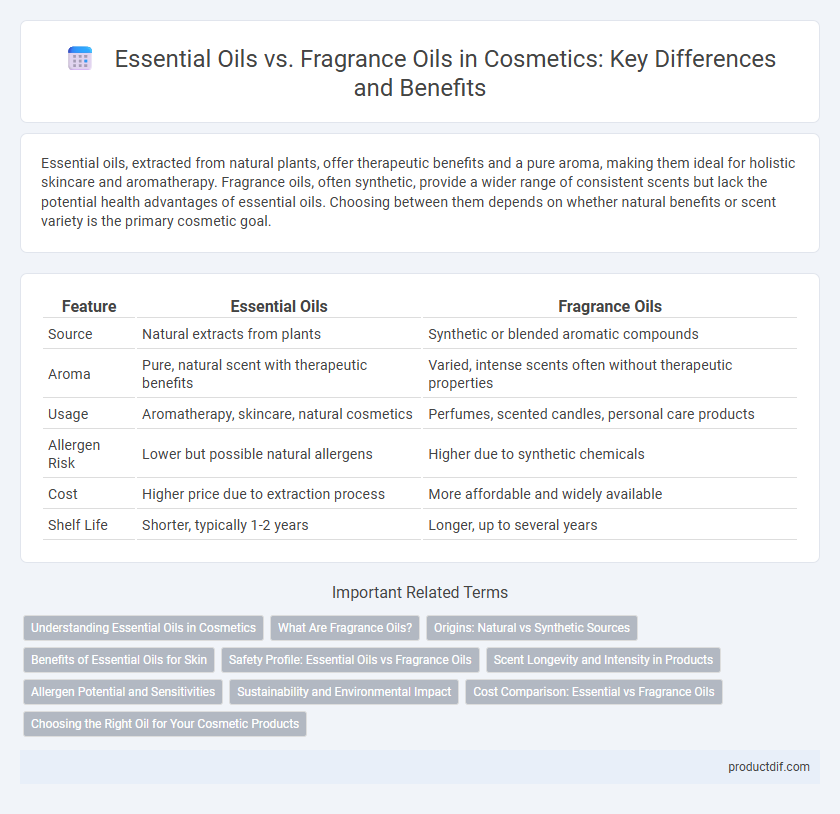Essential oils, extracted from natural plants, offer therapeutic benefits and a pure aroma, making them ideal for holistic skincare and aromatherapy. Fragrance oils, often synthetic, provide a wider range of consistent scents but lack the potential health advantages of essential oils. Choosing between them depends on whether natural benefits or scent variety is the primary cosmetic goal.
Table of Comparison
| Feature | Essential Oils | Fragrance Oils |
|---|---|---|
| Source | Natural extracts from plants | Synthetic or blended aromatic compounds |
| Aroma | Pure, natural scent with therapeutic benefits | Varied, intense scents often without therapeutic properties |
| Usage | Aromatherapy, skincare, natural cosmetics | Perfumes, scented candles, personal care products |
| Allergen Risk | Lower but possible natural allergens | Higher due to synthetic chemicals |
| Cost | Higher price due to extraction process | More affordable and widely available |
| Shelf Life | Shorter, typically 1-2 years | Longer, up to several years |
Understanding Essential Oils in Cosmetics
Essential oils, derived from natural plant extracts, contain bioactive compounds that offer therapeutic benefits and skin-nourishing properties in cosmetics. Unlike fragrance oils, which are synthetic and primarily used for scent, essential oils contribute antioxidant, anti-inflammatory, and antimicrobial effects, enhancing skincare formulations. Incorporating essential oils such as lavender, tea tree, or rosemary into cosmetic products ensures a blend of fragrance and functional skin benefits, promoting healthier and more vibrant skin.
What Are Fragrance Oils?
Fragrance oils are synthetic or natural compounds specifically formulated to replicate scents and enhance cosmetic products with long-lasting aromas. Unlike essential oils, fragrance oils often contain a blend of natural extracts and chemical components designed for consistency and cost-effectiveness in perfumes, lotions, and soaps. These oils provide vibrant, diverse fragrance profiles without the therapeutic properties found in essential oils.
Origins: Natural vs Synthetic Sources
Essential oils derive from natural plant sources, including flowers, leaves, bark, and roots, extracted through processes like steam distillation or cold pressing. Fragrance oils, on the other hand, are primarily synthetic compounds created in laboratories to mimic natural scents or develop unique aromas not found in nature. The natural origin of essential oils typically offers therapeutic properties, while fragrance oils provide a wider variety and more stability in cosmetic formulations.
Benefits of Essential Oils for Skin
Essential oils provide natural antioxidant, anti-inflammatory, and antimicrobial properties that promote healthier skin by reducing redness, acne, and signs of aging. These oils contain bioactive compounds such as terpenes and phenolics, which support skin regeneration and hydration without synthetic additives. Unlike fragrance oils, essential oils offer therapeutic benefits that enhance skin vitality and overall appearance.
Safety Profile: Essential Oils vs Fragrance Oils
Essential oils are derived from natural plant sources and typically contain bioactive compounds that can offer therapeutic benefits, but they may also cause allergic reactions or skin sensitivity if used improperly. Fragrance oils are synthetic or blended aromatic compounds designed for scent, often without therapeutic properties, and can include allergens or irritants, making their safety profile less predictable. Evaluating the safety of essential oils versus fragrance oils involves considering factors such as purity, concentration, source, and individual skin sensitivity to minimize adverse reactions.
Scent Longevity and Intensity in Products
Essential oils provide a natural, complex aroma with moderate scent longevity, often lasting 1 to 3 hours on the skin, while fragrance oils offer a more potent and consistent scent that can persist up to 8 hours or longer. The molecular structure of essential oils results in faster evaporation, reducing intensity over time, whereas synthetic compounds in fragrance oils enhance both longevity and strength. Choosing between essential and fragrance oils depends on product formulation goals, balancing natural appeal with extended scent performance.
Allergen Potential and Sensitivities
Essential oils, derived from natural plant extracts, possess a higher risk of causing allergic reactions and sensitivities due to their complex chemical compositions containing compounds like limonene and linalool. Fragrance oils, often synthetic, are formulated to minimize allergenic components but may still trigger sensitivities in individuals with fragrance allergies or sensitive skin. Selecting hypoallergenic products with clear ingredient disclosures is crucial for consumers concerned about allergen potential in cosmetic formulations.
Sustainability and Environmental Impact
Essential oils, derived from natural plant sources through steam distillation or cold pressing, offer a more sustainable and eco-friendly option compared to synthetic fragrance oils, which often rely on petrochemicals and contribute to environmental pollution. The extraction of essential oils supports renewable agricultural practices and biodegradable waste, reducing carbon footprints and promoting biodiversity conservation. In contrast, fragrance oils can persist in ecosystems, posing risks to aquatic life and soil quality due to their synthetic chemical composition.
Cost Comparison: Essential vs Fragrance Oils
Essential oils often command a higher price due to their natural extraction from plants and complex distillation processes, whereas fragrance oils are typically more affordable as they are synthetically produced. The cost difference can be substantial, with essential oils ranging from $20 to over $100 per ounce compared to fragrance oils, which may cost between $5 to $20 per ounce. Brands and consumers balance these costs against factors such as purity, longevity, and scent authenticity when choosing between essential and fragrance oils in cosmetic formulations.
Choosing the Right Oil for Your Cosmetic Products
Essential oils, derived from natural plant extracts, offer therapeutic benefits and a true-to-nature scent, making them ideal for organic and skin-friendly cosmetic products. Fragrance oils, synthesized or blended from natural and synthetic ingredients, provide a consistent, long-lasting aroma suitable for products requiring specific, customizable scents. Selecting the right oil depends on product formulation, desired fragrance intensity, skin sensitivity considerations, and overall brand positioning toward natural versus synthetic ingredients.
Essential Oils vs Fragrance Oils Infographic

 productdif.com
productdif.com